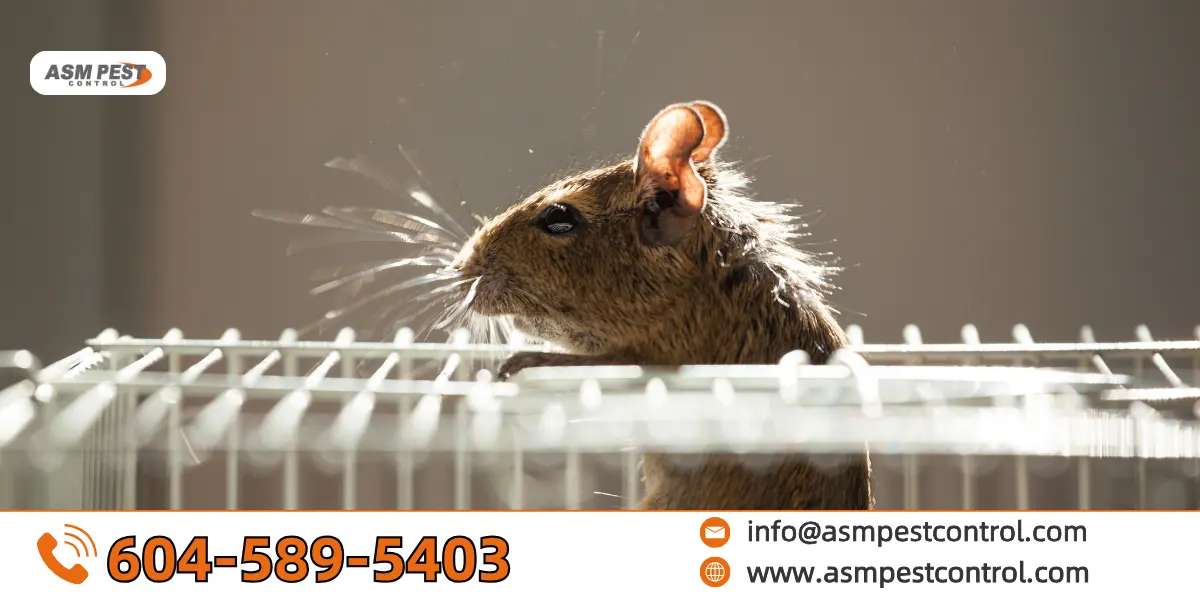The sight of a mouse or rat in your house can cause a surge of concern, and worries about rabies can arise. But the real question is: Do Rodents Carry Rabies? Knowing the facts will enable homeowners to remain poised, knowledgeable, and secure.
Understanding Rabies and Its True Carriers
Rabies is a viral disease that affects and kills mammals by attacking their nervous systems. All the warm-blooded animals, in theory, may be affected, but patterns indicate that this virus is limited to bats, raccoons, skunks, foxes, and occasionally larger rodents, including groundhogs or beavers. Small rodents, such as mice, rats, squirrels, hamsters, chipmunks, and gerbils, are infrequently infected or understood to be carriers of rabies in humans. But they can still pose other serious health risks, making professional services like rodent control Surrey an important part of keeping homes safe.
Why Rodents Are Unlikely Rabies Carriers
- High Fatality Before Transmission
A small rodent bitten by a rabid predator will most likely die off in time before the virus can multiply and infect the saliva, and stop the spread of rabies before it happens.
- Low Exposure Risk
Encounters with larger species that may be rabies carriers are avoided by rodents, limiting their exposure and likelihood of becoming carriers of the virus.
- Lack of Documented Cases
Although small rodents, especially rodents with rabies, have been heavily monitored, very few confirmed cases of humans being infected have been recorded. Even where rabies is present, involvement of rodents is not likely to be found.
Exceptions Are Rare and Mostly Involving Larger Rodents
Though mice and rats pose essentially no risk of rabies, larger rodents such as groundhogs or beavers are occasionally reported to have rabies.
The Real Dangers: Other Rodent-Borne Diseases
Rabies is not a big issue, at least with most rodents, but other health hazards are more imminent and possibly severe:
- Rat-bite fever (RBF): The condition is caused by bacteria like Streptobacillus moniliformis. RBF may develop days following a bite and can include fever, rash, and muscle aches. And it has been seen in approximately 10 percent of rat bites and is life-threatening when not treated.
- Other infections: Rodents can cause leptospirosis, hantavirus, lymphocytic choriomeningitis virus (LCMV), salmonella, and others. Such diseases are more widespread and dangerous than rabies during common rodent interactions.
What Every Homeowner Should Do
After any rodent bite or scratch:
- Clean the wound immediately with soap and water.
- Monitor for infection signs or symptoms like fever, swelling, or rash.
- Seek medical care promptly; doctors may prescribe antibiotics even if rabies isn’t a concern.
If a larger rodent (such as a groundhog or beaver) is involved, especially if behavior was odd or aggressive, consult rodent control Burnaby.
Proactive preventive steps include sealing entry points, reducing attractants like food and shelter, and keeping pets vaccinated against rabies, since they face greater exposure risk through wildlife.
When to Involve Pest Control Professionals
ASM Pest Control professionals can provide knowledge of rodent burrow locations, numbers, and types, which is valuable information because larger rodents such as groundhogs or beavers could pose a greater risk of rabies and other associated animal diseases.
The professional services also guarantee humane removal practices, adherence to existing laws on wildlife, and long-term prevention measures. This could involve closing off holes, erecting exclusion doors, and giving continual surveillance so that rodents will not gain entry again.
To the homeowner, this is something more than just getting rid of the existing problem because it also minimizes the possibility of a recurring infestation, avoids damage to wires or insulation, and prevents contact with rodent-related diseases such as rat-bite fever, leptospirosis, or hantavirus.
FAQs
- Can rodents transmit rabies?
Rarely. Small mammals such as mice, rats, squirrels, chipmunks, and hamsters are extremely rarely found infected or involved in human rabies cases. - Should I get a rabies shot if bitten by a rodent?
Generally no. PEP isn’t advised after a typical mouse or rat bite. It may be considered if a larger rodent, like a groundhog, causes a bite or scratch, particularly under unusual circumstances. - What diseases from rodents pose a real threat?
Rat-bite fever, hantavirus, leptospirosis, LCMV, and salmonella are among the more common infections transmitted by rodents, often via bites, scratches, or contact with urine and droppings. - Why aren’t rodents significant rabies reservoirs?
Due to their small size, rodents rarely survive being bitten by a rabid predator; they lack specialized habitats for maintaining rabies, reducing their role in transmission. - What prevention measures should I take?
Ensure your home is sealed against rodent entry, maintain cleanliness to deter infestations, handle bites proactively with wound care and medical advice, and keep pets vaccinated to mitigate wildlife interactions.
Final Takeaway
The concern Do Rodents Carry Rabies? is understandable but largely unfounded when it comes to common small rodents like mice and rats. While the rabies risk is negligible, these pests still pose health dangers through bacterial and viral infections. Prompt wound care, cautious handling, and effective prevention strategies are your best defense.






